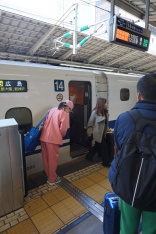Home › magazine › case studies › Japan’s cleaning sprinters
Japan’s cleaning sprinters
6th of June 2016If you have ever visited Tokyo you probably noticed how clean the city is. This is not surprising in a country where cleaning has historically been considered an important part of the culture. To better understand the importance of the cleaning industry, Bobbie van der List - writing exclusively for ECJ - followed the cleaners of SMT, the company responsible for cleaning the high speed Shinkansen trains in Tokyo.
Tokyo – the staff of the Tokyo based cleaning company SMT are spread across platform nine of Tokyo station. As the impressive bullet shaped nose of the Shinkansen high-speed train slowly approaches, the cleaning staff make a deep bow to greet the train, thankful for the safe arrival. This ritual is repeated once the doors of the Shinkansen open: the cleaners greet each outgoing passenger with a respectful bow.
This is illustrative of the great number of cleaning rituals Japan knows, and simultaneously shows us how few cleaning rituals we have in the west. “Bowing and cleaning are important aspects of our culture, which is best reflected by the concept of omotenshi, the Japanese term for hospitality”, says the manager of SMT, Mashimitu Shirama in a conference room at Tokyo Station.
SMT is the company responsible for cleaning the Shinkansen trains at Tokyo Station. Shirama wants to add that the bowing is also their way of expressing their appreciation to the passengers using the Shinkansen. Shirama explains: “In the end it is the passengers who pay our salary, they are the ones using the train.”
The appreciation comes from both sides though, considering the huge numbers of letters SMT receives from passengers who express their gratitude for the work the cleaners of SMT do on the tracks, inside the trains and at the train stations. One of the employees of SMT brings out
a box filled with drawing and signs of admiration. It is clear that the public recognises the efforts by the men and women of SMT.
Interestingly, Shirama repeatedly says his employees do not necessarily consider transport JR Central (the company operating the Shinkansen and which de facto hires SMT for cleaning the trains) as their client; instead they see the passengers as their clients. This notion of a direct link between cleaners and the people using the spaces that are cleaned becomes obvious if you go for a walk through Tokyo: cleaners are everywhere and very visible on the street.
This is a stark contrast with the west, where cleaners often work outside office hours at times when no one is around to be “disturbed”. Japan therefore functions as an interesting alternative approach to cleaning and gives us a better understanding how differently the cleaning profession is perceived.
The cleaners are an essential part of the service that JR Central provides to its passengers.
The products SMT uses for cleaning the Shinkansen are as simple as they are innovative. Manager Shirama walks towards a pre-arranged cleaning kit that is used by all the individual cleaners. “The most important aspect of the cleaning equipment is that it should enable our employees to move easily in the train, they need to be mobile so they can rapidly clean everything”, Shirama explains, while holding the cleaning kit in his hand.
The cleaning bag has one additional vertical compartment where the dustpan can be stored, which is filled with a plastic waste bag. In one movement you can get rid of the dirt and store the dustpan at the same time. The most impressive aspect of the kit is the duster which incorporates a water detection system. To illustrate how it functions Shirama empties a bottle of water on a sofa. He holds the duster above the seat and the duster starts beeping.
Shirama explains: “In the Shinkansen one of the challenges is to clean the seats, where liquid may have been spilled. It is not always easy to see this immediately so previously we had to carefully check each seat. Now we just need to hold this simple tool above the seat and we know if there is any kind of liquid that needs to be cleaned.”
Preparation vital
The contrast between the relaxed interview and the briefing for the cleaning staff responsible for the afternoon shift could not be greater. Employees of SMT have gathered in the conference room to listen to a motivational speech by one of the supervisors. They are informed about the most recent changes in their routines. After the speech the several teams gather to double-check the equipment.
The cleaners of the inside of the train double-check if they have everything and loudly check if the electronic detection device on their duster is still working. On the other end of the room the supervisors gather, to do one final round to see if they all have the necessary keys of the train, before heading to platform nine.
While waiting for the train to arrive, supervisor Yasuzawa has to think for a few seconds when asked about the biggest challenge of their work: “That is probably the time pressure. It is very difficult that we just have 12 minutes to clean the Shinkansen. If you consider all the possible things that could happen, I think 12 minutes is very short. Back in the day we had more time, but nowadays the Shinkansen goes more often and therefore there is less time for it to stand still on the track”, she says.
The public address system announces that the train will shortly arrive, but is two minutes behind schedule, which means the team has only 10 minutes to clean the train. With astonishing speed the crew cleans the Shinkansen, one carriage after another. Once all the carts are cleaned, supervisor Yasuzawa gives the signal to the conductors of JR Central, after which the passengers can board.
The secret of SMT’s success can be found in its approach to cleaning, says Shirama. Their philosophy is perhaps best summed up by their catch phrase: “we clean it so it won’t become dirty”. Shirama believes too many cleaning companies have a mindset different to theirs, where the philosophy is: “we clean it because it is dirty”.
The underlying notion of SMT’s approach is to ensure that the Shinkansen is clean at all times. According to Shirama this leads to more responsible behaviour by the passengers. On the information leaflet Shirama is holding, this becomes clearer with an illustration.
You can see a window that is broken and has not yet been repaired, rubbish on the street, and an ashtray full with cigarettes. SMT believes that by not maintaining and cleaning properly you indirectly invite people to make more rubbish, and to not look after the space they use. SMT believes strongly in the notion that keeping the trains, stations and tracks clean adds to
an environment in which people produce less rubbish and the total volume of waste decreases.
Japanese cleaning culture
Shin Omori is professor at the Nihon University College of Economics in Tokyo and did extensive research about the Japanese cleaning culture. “Japanese people value personal hygiene more than any other nation. The reason behind this is twofold. On the one hand we can track this back to the humid climate in Japan, which led people to be overly concerned with staying fresh and clean.
Secondly, there is a historical reason: the main religion, Shinto, prescribes Japanese people to cleanse their body thoroughly every day. It partially explains why there are so many public baths and onsens in Japan, places where people go to get rest and cleanse their bodies”, Omori explains.
Historically Japanese companies are very much concerned with the maintenance and cleaning of workspaces. “Japanese companies have always placed huge emphasis on the importance of Souji (cleaning) and Seiri Seiton (sorting). Workers get special training and students are trained in this from a very young age. The result is that Japanese companies – and people more in general – have come to appreciate a clean and tidy working space”, he continues.
Now he notices a slow transition, however, with more companies outsourcing the cleaning to cleaning companies. “I am afraid our cleaning culture will be negatively influenced if the cleaning function is outsourced to cleaning companies, but times are of course changing.”










